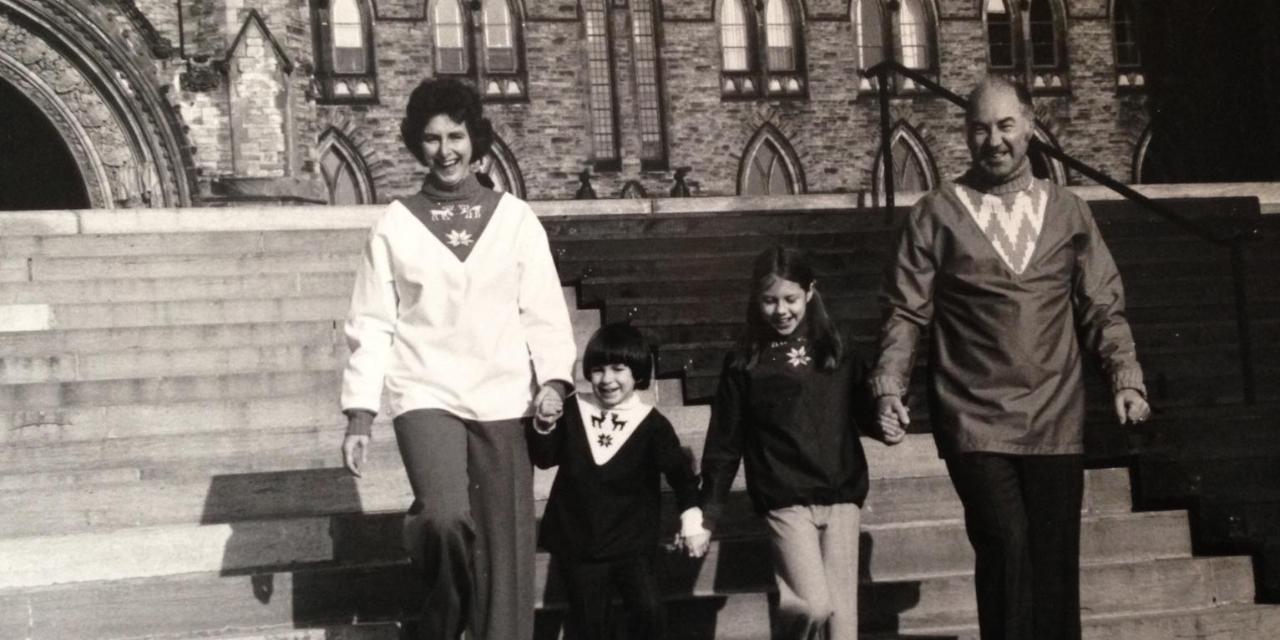Guided by a passion for home
If asked to describe Bill Rompkey, most people would say he was a successful politician, or maybe a dedicated teacher, or perhaps a strong supporter of Labrador.
All would be correct.
What you might not expect to hear is, “Mr. Memorial.”
It’s TWIRP Week 1957.
Dr. George Story and a companion had suggested to the Students’ Council that they sponsor TWIRP (The Woman Is Requested to Pay) Week. Inspired by the tradition of Sadie Hawkins dances, TWIRP Week would reverse the gender roles of the time. A woman would ask a man to be her date at the dance ending the week. She must call on him, open the door, give him her chair if there’s a shortage and pay (but not escort him home!).
Memorial Music Makers, a group of student musicians that included Bill Rompkey on piano, provided entertainment for the TWIRP dance (he had moved on from his days as bugler and drummer with the Church Lads Brigade).
But his crowning glory of the evening was beating out the other contenders and being named Mr. Memorial.
Perhaps it was foreshadowing as he would later be recognized with an Alumnus of the Year Award in 1980 and an honorary doctorate in 2000, both from Memorial.
Pretty good for a person who would later describe his younger self as The Beatles’ “Nowhere Man” who “knows not where he’s going to.”
Where he went was Memorial University. He earned a BA, MA and diploma in education. The latter took him to Labrador, the land he fell in love with and dedicated his life to for the next four decades.
His life in Labrador began first as principal of the Yale School in North West River, then as first superintendent of education with the Labrador East Integrated School Board.
It was during this time that he came to understand the difference between the island and mainland of the province, often referring to them as two uneasy stepsisters sharing a common home.
He and his wife, Carolyn, became part of the community.
He discovered they were Newfoundlanders living among Labradorians. He learned their history, songs and stories, and he put all he learned into his book, The Story of Labrador, one of four books he would write and of which he was most proud.
He became involved, in his own words, “in the ferment of self-help and self-realization” that had taken roots in Labrador in the 1960s.
In the 1970s, he helped organize Labrador in the ’70s, the first of a series of conferences on the future of Labrador and its people that brought together representatives from Labrador and the island for the first time to assess the present and future of The Big Land.

Carolyn, Peter, Hilary and Bill Rompkey on the steps of the Canadian House of Parliament in Ottawa early in Dr. Rompkey’s political career. Photo from the Gazette.
But politics would come calling in the form of Drs. Ed Roberts and Mel Woodward. In what might be a first in Canadian politics, the political pitch from the doctors took place in the sauna of the old Battery Hotel, now Signal Hill Campus. By his own admission, Dr. Roberts was the best dressed of the three as he was wearing his glasses. The three would stay close friends for many years.
Dr. Rompkey was first elected as a Liberal, representing the old federal riding of Grand Falls-White Bay-Labrador, and went undefeated in six subsequent elections to represent the new District of Labrador. He served in the cabinets of Pierre Trudeau and John Turner and was appointed to the Senate in 1995 by Jean Chrétien.
The conferences he helped organize in the 1970s set the agenda for much of his work as a Member of Parliament. For example, he secured federal funding for airstrips in northern Labrador, expanding access to remote communities, and the Trans-Labrador Highway, which improved regional connectivity.
Less known is his support for the music school on the St. John’s campus. For its first nine years, the school was housed in what then-president Leslie Harris referred to as a rat-infested shed, unfit for human habitation. Prospects for a proper facility were bleak.
With his love of music and belief in Memorial spurring him on, Dr. Rompkey persuaded the federal government to make a substantial contribution to the project. That ray of hope led the university to begin a campaign to raise its portion of the funding. In the fall of 1985, the School of Music moved into one of the finest facilities in the country.
Carolyn Rompkey, along with her children Peter and Hilary, created the Honourable Dr. William Rompkey Memorial Scholarship in 2017 to remember her late husband.
Created in the spirit of two things that have defined their family — Labrador and higher education — the scholarship goes to a first-year student who graduated from a high school in Labrador.
Dr. Rompkey once said Memorial University is the most important institution in the province; he’s one of the individuals who made it so.
 0001 3-370x493.jpg)